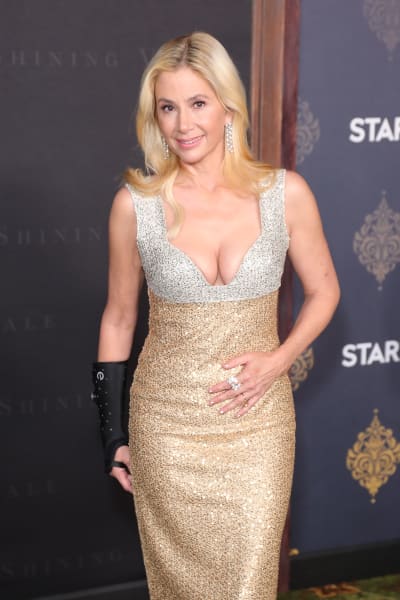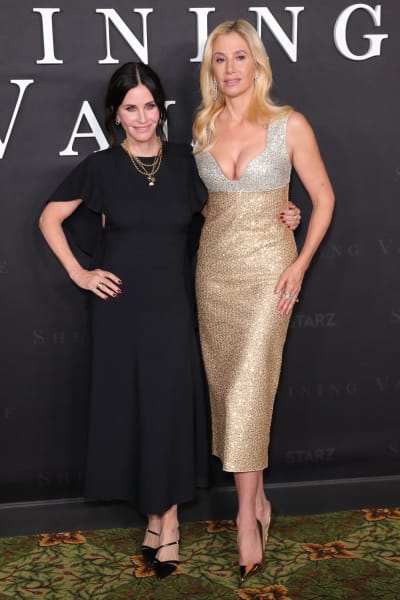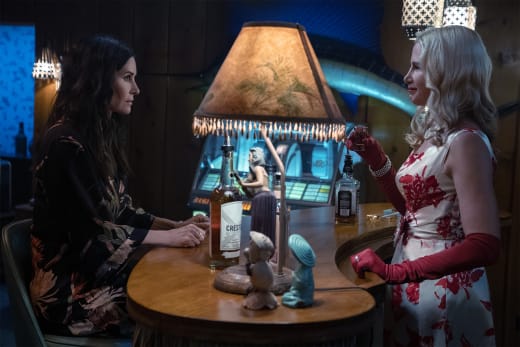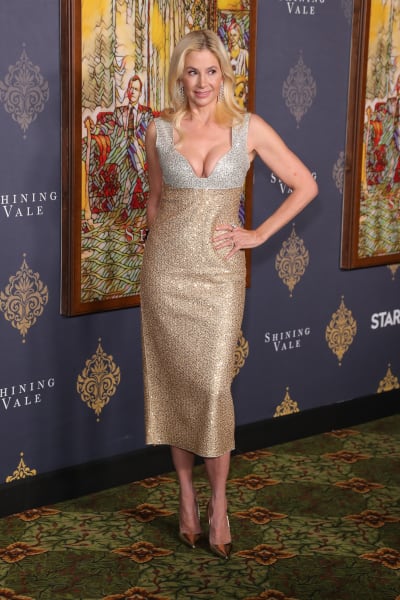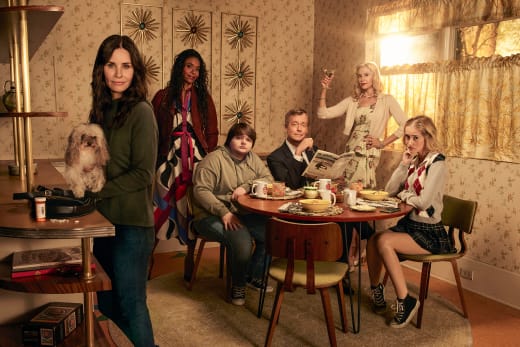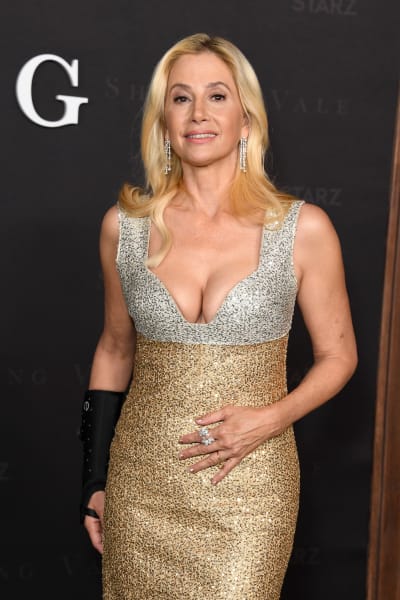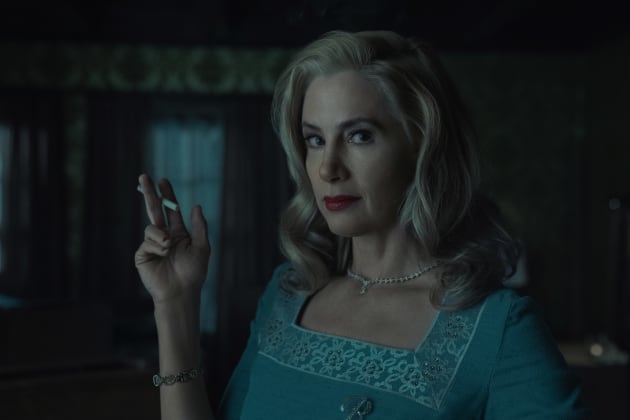
Mira Sorvino has a way with blondes. She plays them to perfection, and it’s as much a choice as it is her talent.
She spoke with TV Fanatic about her role on Shining Vale as either an actual ghostly entity inserting herself into a situation or the id to Courteney Cox’s yang, Pat.
She’s got a lot of great insight, so please enjoy the interview.
Hi, Mira. So nice to meet you.
Hi, nice to meet you too.
So how did you get involved with Shining Vale?
I think it was sent to my agents, and then Jeff Astrof and I had a conversation about the character, and he sent me the script and sent me some later scenes because, obviously, in the pilot, I don’t appear that much.
And I got to see some of her inner workings from later in the proposed season because remember, we were just a pilot at that point, and I just thought that it was fantastic. And, and then we had like a sort of a zoom meeting with Courteney, and that went really well.
And I loved her, and I already knew her, not very well, but I had met her before, and she’d been very kind, and I was super excited about it, and I think she was happy with it. And off we went and did the pilot.
When I chatted with Jeff and Sharon, Jeff mentioned that you were very appreciative for having the opportunity to play this type of role and the type of character that Rosemary is. Can you talk about that a little bit?
Well, for me, Rosemary sort of falls right into the sweet spot of my wheelhouse because I love playing these slightly larger-than-life, slightly strange, funny, vulnerable, surprising blonde characters.
This character had to be platinum. And I said to Jeff, I was like, “do you want me to bleach my hair? I’ll bleach my hair for it.”
And I did because at that time I had like a sort of sandy blonde streaky, you know, the way it is growing in now like it was like that, you know, and I took the whole head and lifted it up. It was white; it was very white.
And I think that really helped because it also gave her this sort of ghostly, bleached period vibe. But I got to build her from the fifties aspect up because she was a real person in the house.
She was a woman that lived in the house 70 years earlier and got to kind of build that persona who is sort of miserable and beaten down and has dreams and aspirations that are completely stomped on by her kind of lummox of a husband, who’s not kind and betrays her.
And she’s very unhappy. But, she’s more small-time, then her dreams of who she could be then become the ghost.
So when she’s the ghost version or the ectoplasm version of her, she’s grand and fabulous and coiffed to the nines and has the most amazing dresses and jewelry, she’s like living in a fifties movie, and she’s so excited about being alive and having someone to connect with.
And that gives a great counterpoint to sort of no-nonsense Pat-like realism of Courtney’s character.
And I love that she could swing in and out of being this sort of frothy person who was sort of obsessed with certain anachronistic goals, like throwing a fabulous party or you know, going to Paris, which I still think is not that anachronistic but, and then the sad her would sometimes appear.
You’d feel the sadness, the empathy you’d have for her because you could feel the bleeding-heart real Rosemary inside of her.
And then at other times, you start to see the more slightly sinister aspect of her because, ultimately, in all of these stories, somebody from that side of the tracks of the living and dead tracks, but they’re not usually here to do good, so it’s in her nature, she can’t help herself.
It’s like the scorpion that eventually stings the frog.
She’s going to wreak havoc, but there is truth to things that she says; there’s truth in what she’s trying to urge Pat on to about sort of self-actualization, and breaking the rules, and living life by her own terms, and not accepting society’s dictates about what she should be or can or cannot be, and what her husband thinks she should be.
You know, it’s just like, be fabulous, be everything, live fully, soar kind of thing.
And of course, her version of that is a little bit morality free, but it’s a very interesting role to play because half the things she says are very wise, and then the other half is a little bit chaos-inducing, but then she’s always fun. I feel like there’s always fun to her.
There’s a physicality to her the way she moves around a room, the way she uses her walk and her dress, and I just really enjoyed creating her and being her.
Everything that you said about how she’s sometimes buried down and then other times she’s larger than life. Does that kind of give you the freedom within that space to really create something special of your own?
Well, I think that’s what I’m good at. Like I don’t want to toot my own horn and say I did such a great job with her or not. This is just what I love doing.
Like, I love taking these characters who are a bit odd, and I don’t think anyone else would do them the way that I do them. It’s just the way I see them. And they’re part of my, like, blonde pantheon, and being blonde is a part of it.
Like they’ve got to be blonde for them to be this kind of person, but they’re all different from each other. I mean, she’s very different from Romy, very different from Linda Ash, very different from Marilyn and Norma Jean’s Marilyn.
It’s different from Jeanne Crandall in Hollywood. Like even though Marilyn, Jeanne, and she are all period actress roles in a way, they’re all quite different from each other. So I guess just my creativity is sparked by this kind of character. And I guess I feel a joy in getting to be exuberant.
I did notice a little bit of your Marilyn voice at certain times with Rosemary. Did you do that on purpose? Kind of give her that Marilyn-esque feel?
Well, I mean, look, everyone in the fifties movies sort of spoke that way. And so yes, especially when she was more in her soft and seductive side, but she still always has that patois, you know, that ‘come on, let’s get crazy.’
You know, that’s just that thing. But even if you watch those 1950s housewives shows, they all have that odd way of speaking that I don’t know that people really spoke that way.
Like all of my older relatives, none of them speak that way. Like, I don’t know who spoke that way, but everyone on TV and the movie spoke that way. So I was doing this sort of fifties-era because I feel like she’s a creature of media. She wanted to be what she saw on the silver screen or on the small screen.
That was her horizon because she had this very cloistered life with a husband who wouldn’t even let her do her own shopping. She’s not even really allowed to buy what she wants at the supermarket. So, she’s just very like a kept woman, not in a mistress kind of way, but just like she’s a bird in a cage.
Shining Vale Premieres on March 6, 2022, with two back-to-back episodes beginning at 10/9c.
Carissa Pavlica is the managing editor and a staff writer and critic for TV Fanatic. She’s a member of the Critic’s Choice Association, enjoys mentoring writers, conversing with cats, and passionately discussing the nuances of television and film with anyone who will listen. Follow her on Twitter and email her here at TV Fanatic.

